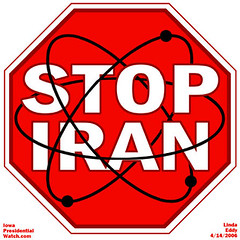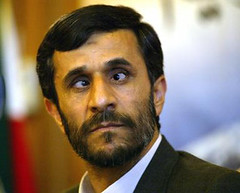Friday, September 19, 2008
IRAN A HEARTBEAT AWAY FROM A-BOMB! TIME TO ACT!
Iran is just a heartbeat away from the A-bomb. Last Friday the Daily Telegraph reported Teheran has surreptitiously removed a sufficient amount of uranium from its nuclear production facility in Isfahan to produce six nuclear bombs.
Given Iran's already acknowledged uranium enrichment capabilities, the Telegraph's report indicates that the Islamic Republic is now in the late stages of assembling nuclear bombs.
It would be a simple matter for Iran to assemble those bombs without anyone noticing. US spy satellites recently discovered what the US believes are covert nuclear facilities in Iran. The mullocracy has not disclosed these sites to the UN's International Atomic Energy Agency, which is charged with inspecting Iran's nuclear sites.
As to the IAEA, this week it presented its latest report on Teheran's nuclear program to its board members in Vienna. The IAEA's report claimed that Iran has taken steps to enable its Shihab-3 ballistic missiles to carry nuclear warheads.
With their range of 1,300 kilometers, Shihab-3 missiles are capable of reaching Israel and other countries throughout the region.
In support of its swiftly progressing nuclear program, Iran has escalated both its conventional military and terroristic adventurism. It has also ratcheted up its diplomatic assault on the US. This week, Teheran conducted a countrywide air defense exercise. Gen. Khatim al-Anbiaa, the commander of Iran's Air Defense Corps, explained that the exercise was aimed at defending against both electronic jamming systems and actual bombing strikes.
Also this week, Yahya Rahim Safavi, the former commander of the Revolutionary Guards Corps and current senior adviser to Supreme Leader Ayatollah Ali Khamenei for security affairs, announced that Iran has shifted responsibility for naval warfare on the Persian Gulf from its regular naval forces to its more fanatical Revolutionary Guards. The Iranian navy will now be deployed only in the Gulf of Oman and along the Caspian Sea.
The deployment of the Guards along the Persian Gulf means that the force will be responsible for naval operations in the narrow Strait of Hormuz, through which 40 percent of global oil shipments travel. Issuing Iran's most explicit threat to US naval forces in the area and global oil shipments to date, Safavi declared, "The entire Strait of Hormuz is under the tight control of the Iranian security forces, which are ready to defend Iran against any threat."
As for terror, al-Qaida boss Ayman Zawahiri's recent tirade against the Islamic Republic notwithstanding, Iran has apparently intensified its cooperation with al-Qaida. Over the past two weeks, Israeli counterterror officials have issued explicit warnings to Israeli vacationers to immediately depart from Sinai.
They have stated that terror cells from al-Qaida and Hamas are working with Iran's Hizbullah to abduct groups of Israeli vacationers to Gaza. Moreover, as Hamas and Teheran have openly acknowledged their "brotherly" ties, more and more reports have been published about al-Qaida's escalating presence in Gaza.
Beyond all this, both regionally and globally Iran is escalating its diplomatic and strategic offensive against the US. It has widened its diplomatic operations in the Western hemisphere from Venezuela, Cuba, Ecuador and Nicaragua to the Caribbean by opening diplomatic relations with Grenada and St. Vincent, and it is pursuing diplomatic ties with Jamaica.
Teheran has initiated its own pro-Russian diplomatic initiative to "stabilize" the Caucasus. This week Iran's Foreign Minister Manoucher Mottaki caught the US State Department by surprise when he arrived in Tblisi to meet with Georgian President Mikheil Saakashvili. That meeting was part of a regional tour that took Mouttaki to Russia, Azerbaijan and Armenia, as well as Germany.
Finally, of course, there is Iranian President Mahmoud Ahmadinejad's annual trip to New York for the UN's General Assembly opening session next week. Aside from being honored by leaders of the supposedly pacifist and clearly anti-Semitic Quaker and Mennonite churches, Ahmadinejad will be feted by newly elected General Assembly President Miguel d'Escoto Brockmann from Nicaragua.
COUNTERING TEHERAN'S sprint to the nuclear finish line and its intensifying threats against Israel and the West are three Western initiatives to prevent Iran from acquiring nuclear weapons.
First, the US, France and Britain have stepped up their rhetoric calling for additional economic sanctions against Iran.
During the General Assembly meeting in New York, US Secretary of State Condoleezza Rice is scheduled to meet her counterparts from the other permanent members of the Security Council and Germany to try to agree on such sanctions. But this will be an exercise in futility.
Russia has made clear that it will reject any further sanctions. Indeed it is intensifying its military and financial ties to Teheran. Moscow has pledged to have the Bushehr nuclear plant up and running by the end of the year. And Iran is already suspected of diverting plutonium from the plant to develop still more nuclear weapons.
Germany, too, has evinced no interest in curtailing its financial ties to Teheran. To the contrary, German trade with Iran expanded 12% in the last year, from $2.7 billion to $3b.
So the US will fail to pass additional sanctions against Iran in the UN Security Council. And this is a shame. But even if a miracle occurred and Russia, China and Germany agreed to adopt and enforce stiff sanctions against Iran, those sanctions would come too late to prevent Iran from acquiring nuclear weapons.
The uranium that the Iranians took from their Isfahan plant will be weapons grade and attached to Shihab-3 missiles or transferred to Hizbullah, al-Qaida or Hamas terrorists for use long before such hypothetical sanctions would even be noticed.
The second way that the West - and particularly the US and Israel - have sought to stymie Iran's nuclear ambitions is through sabotage. As Yediot Aharonot reporter Ronen Bergman documented in his book, The Secret War with Iran, over the past few years the Mossad and US intelligence agencies have had some success killing personnel involved in Iran's nuclear weapons program.
They have also managed to sell faulty nuclear components to Teheran that have slowed down and sabotaged its operations.
As the assassination of Iran's terror master Imad Mughniyah in Damascus in February demonstrated, Israel has the capacity to carry out sensitive covert operations deep inside enemy territory. And more successful covert operations could no doubt cause still more damage to Iran's nuclear program.
But it is all but impossible to see how any such operations can prevent Iran from acquiring nuclear weapons in the short term. With that uranium from Isfahan hidden away in one of its covert facilities, with terror operatives deployed all over the globe and in charge of Lebanon and Gaza, and with the Shihab-3 missiles happily accepting nuclear warheads, it is apparent that no matter how bold, limited covert operations have not and will not prevent Iran from crossing the nuclear threshold.
Finally, there are the private initiatives to use international law, capital markets and political pressure to deter Teheran from acquiring nuclear weapons and to persuade states not to cultivate ties with Iran.
A year ago, The Jerusalem Center for Public Affairs began a push to indict Ahmadinejad as a war criminal for his breach of the Convention on the Prevention and Punishment of the Crime of Genocide. His calls for Israel's annihilation make him guilty of the explicit crime of inciting genocide. The JCPA's initiative has fomented similar calls by groups in Canada and Australia and, most recently, by tens of thousands of evangelical Christians.
The Anti-Defamation League and AIPAC are waging public campaigns against European oil and gas companies that are involved in developing Iran's oil and gas fields.
The Center for Security Policy in Washington spearheaded the initiative to divest US public employee pension funds from companies that do business with Iran and other state sponsors of terror.
Several major American Jewish organizations are organizing a massive protest outside UN headquarters that will take place during Ahmadinejad's address to the body next Tuesday. Other groups, like the Israel Project, conduct intensive briefings for the media in the US and Europe to educate reporters and editors about the Iranian nuclear program.
All of these private initiatives are vital for raising public awareness in the West about the lethality of the Iranian threat to Israel and to global security in general. They are also important for embarrassing governments - particularly Germany, Austria and other European governments with histories of anti-Semitic violence - that refuse to end their bilateral trade with Teheran.
Beyond that, they serve the important goal of weakening the Iranian economy.
But again, none of these programs can do a thing against that uranium for six bombs that Iran removed from its plant in Isfahan. They can't stop those centrifuges in Natanz and in covert facilities throughout Iran from buzzing along. They can't destroy those Shihab-3 missiles. They can't kill the scientists assembling the bombs.
IN LIGHT of Iran's unrelenting and rapid progress toward the nuclear finish line, it is clear today that while positive in their own rights, none of the actions the West is taking will succeed in blocking its path to the atomic bomb.
For that matter, the one option short of war that might have put an end to the mullahs' race to the bomb three years ago - namely supporting the Iranian people in their wish to overthrow their regime - cannot be adopted fast enough to prevent the likes of Khamenei and Ahmadinejad from pushing the button now.
Today, there is only one way to prevent Iran from acquiring nuclear weapons. Israel must bomb Iran's nuclear installations. Such a strike will not end Iran's nuclear program. It will not overthrow the regime. It will not cripple Iran's economy. It will not end Iran's active support for international terrorist groups.
All an Israeli air strike against Iran's nuclear facilities will do is set its nuclear program back for a couple of years. Such a strike will buy Israel and the rest of the world time. And during that time, Iran will no doubt expand its diplomatic, terror and political offensives against Israel and the US. But if Israel and the US are wise, they can use the time as well.
If Israel and the US are wise, they will use the extra time to ratchet up international economic sanctions on Iran. They will use the time to conduct covert operations against nuclear and regime targets. They will use the time to increase international pressure on countries that do business with Iran and sell it arms.
And they will use the time that an Israeli military strike against Iran's nuclear facilities will buy to support Iranian democracy movements and so weaken the regime and perhaps eventually topple it.
It is clear today that the Bush administration will not take action against Iran. This week five former secretaries of state said that the US should pursue diplomatic ties with Teheran regardless of Iran's pursuit of nuclear weapons. There will be no will in Washington to act against Iran until after Iran has attacked Israel with nuclear weapons.
So it is up to Israel. Too bad we don't have a government in Jerusalem.
Hat Tip Caroline Glick
Subscribe to:
Post Comments (Atom)














No comments:
Post a Comment